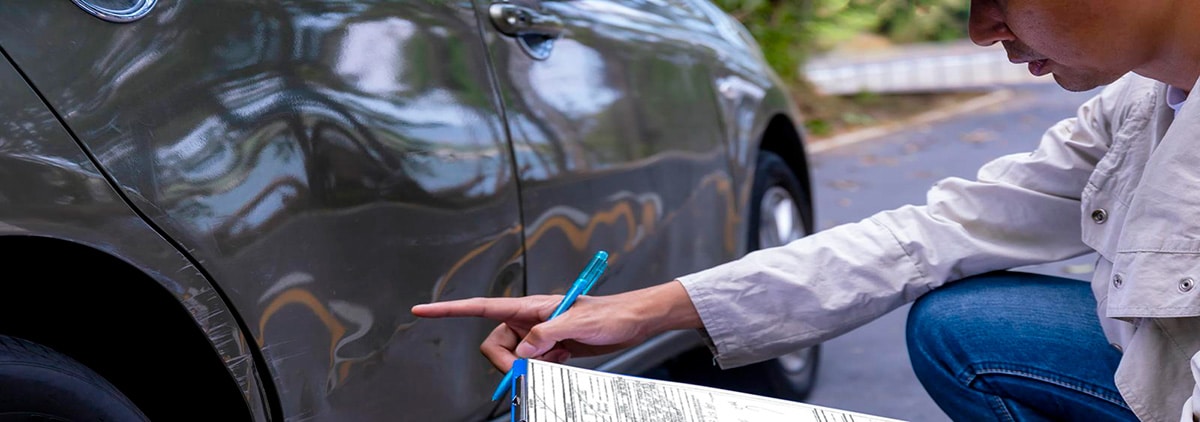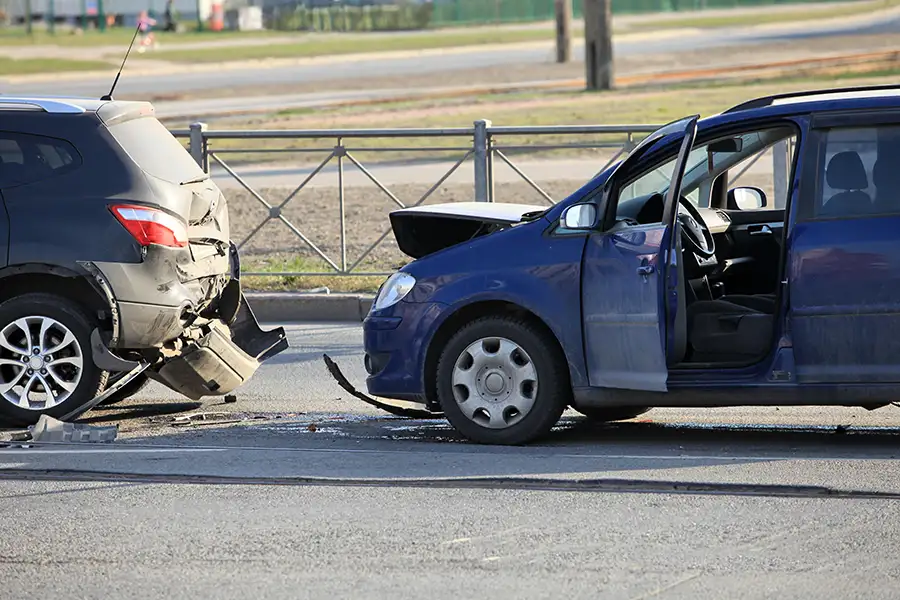
Common Car Accident Scams & How To Avoid Them
A guide to common car accident scams and how to protect yourself
Our Denver car accident attorneys have extensive experience handling injury cases. It doesn’t matter if you have a minor scrape or a major collision, we are here for you.
The National Insurance Crime Bureau (NICB) reports that insurance fraud is the second-most costly form of white-collar crime in America, costing billions of dollars annually.
Car insurance fraud harms the public at large. This is because the majority of U.S. adults drive cars and are exposed to accidents that result in personal injury and property damage. Most car accidents are caused by innocent mistakes of which we are all capable, and insurance is a way of spreading the risk.
Insurance companies are in the business of making a profit. All states regulate insurance companies, and those regulations may include setting allowable premium rates. The incidence of claims is the major factor that regulators use to set allowable rate hikes, which means that it’s in everybody’s interest to fight car accident fraud.

How To Deal With Insurance Company After a Car Accident
Learn what you can do to make your car insurance claim smoother.
What is car accident insurance fraud?
Accident insurance fraud is a subcategory of fraudulent insurance claims involving auto accidents. Professional scammers exploit real or fake auto accidents by stealing insurance proceeds for goods and services during the stages between the accident and a final resolution of the case.
Accident insurance fraud constitutes only a fraction of total insurance fraud. The Coalition Against Insurance Fraud estimates that insurance fraud costs American consumers more than $308 billion annually. More than $45 billion of those losses are attributable to property-casualty (accident) insurance losses.
They further report that:
- Almost 70% of consumers are not aware of auto insurance fraud.
- Auto insurance fraud is underreported, principally because it’s unseen.
- The 2 leading businesses with auto insurance scams are service shops and dealerships.
“Soft” insurance fraud vs. “hard” insurance fraud
Insurance fraud can be separated into 2 main categories:
Soft insurance fraud involves:
- Inflating damages in an otherwise legitimate claim
- Submitting false data to achieve lower premiums or acceptance of applications
Hard insurance fraud involves acts like:
- Staging an accident
- Faking an injury
- Claiming compensation for a pre-existing injury or damage
What are staged accident scams?
Among the most egregious hard scams are staged accidents. These are typically carried out by teams of professional scammers employing sophisticated schemes, planning and coordination. Their different schemes even have catchy titles depending on how they cause the accident:
- Drive down. In this type of accident scam, the scammer typically targets the unsuspecting driver by driving in a way that forces the victim to collide with their vehicle.
- Panic stop. This car accident scam involves a driver deliberately causing an accident by suddenly stopping their vehicle without warning, forcing the car behind them to collide with their car.
- Sideswipe. In this accident scam, the scammer typically waits for a car to initiate a left turn ahead of them and then accelerates quickly to block the turning car, causing that car to collide with their own vehicle.
- Swoop and squat. In this scam, one driver, known as the “swooper,” cuts in front of the victim’s car and abruptly stops, causing a rear-end collision. At the same time, another driver, known as the “squatter,” drives alongside the victim’s car, blocking them from changing lanes and avoiding the collision.
- Backup scam. This type of scam usually takes place at a stop sign or red light and involves the driver in front backing up into the victim behind them and claiming that they were the one who got hit.
How do staged accidents work?
The objective of a staged accident is to establish an insurance claim for the scammer. To make a claim, there must be a demonstrable loss (i.e., an accident that results in property damage or personal injury).
If the scammer fraudulently receives an insurance payment for damage to their vehicle, they have 2 choices:
- They can pay to repair the damage—but then there’s nothing to really gain from the accident.
- They can keep the money but not repair the damage—but then they have a damaged car that can’t be used for another scam.
That’s why, in most car accident scams, the scammer claims to be severely injured. If a personal injury claim is the scammer’s objective, they can sometimes fake their injuries. But they also have a risk of sustaining a real injury during the accident. And then what have they actually gained?
The key is that the staging vehicle is oftentimes only an expendable part of a larger scheme. It’s only a device of a coordinated team of middlemen (e.g., tow truck drivers, doctors, lawyers, repair shops, etc.) who split the ill-gotten gains.
What are non-staged accident schemes?
Often, elaborate schemes are perpetrated without staging an accident but rather exploiting actual auto accidents.
Fake injury claims
Fake or exaggerated injury claims by an insured person are common. Also, injured insured parties claim insurance awards for pre-existing injuries or conditions. Claims are also made for pre-existing property damage.
3rd-party scams
There are usually middlemen service providers juxtaposed between the accident event and a final resolution of the accident consequences. They include tow truck operators, repair shops, windshield replacers and others.
Sadly, there are also unscrupulous doctors, chiropractors and other medical professionals who scam insurance companies by billing for services not rendered.
While the insured parties may not appreciate it, they ultimately bear the costs of scams with their premiums.
Example case of a coordinated team car accident scheme
In 2016, the U.S. District Court in Minneapolis convicted Yahye Mohamed and others of conspiracy and mail fraud for a large-scale scheme to defraud and bilk Minnesota’s no-fault insurance system of millions of dollars.
The conspiracy, active between 2011 and 2016, was orchestrated by a group of unscrupulous chiropractors with the help of “runners,” patients and personal injury attorneys.
Harrow’s role in the conspiracy was as a “runner.” The runner chased real auto accidents and solicited patients for the chiropractor team members’ clinics. The chiropractors paid kickbacks to Harrow and other runners.
The chiropractors or runners also referred patients to personal injury attorneys who were part of the team. Those attorneys filed lawsuits for damages that included exaggerated pain and suffering supported by chiropractor testimony.
Sometimes, patients were recruited as co-conspirators to share in the team’s ill-gotten gains.
Over their 5-year scheme, more than $1 million was paid to runners and patients, and the chiropractors received more than $5 million in fraudulent fees.
The total conspiracy brought charges against 26 individuals in seven different metropolitan chiropractic practices. Twenty-four of the individuals have pleaded guilty or were found guilty at trial.
Red flags that an accident could be staged
There are several signs that you and your insurance company might be the target of an accident scam. They include the following:
- Phony witnesses. Scams are typically perpetrated by accomplices. They position themselves within sight of the accident and testify as witnesses to corroborate the scammer’s story.
- Unsolicited references. Some of the accomplices might be witnesses or early arrivals who refer you to unethical medical clinics or accident lawyers.
- Tow trucks. Always be suspicious if a tow truck shows up without being called.
- Accident doctors. Accident doctors are often referred by scammer accomplices and render unnecessary treatments and long-term rehab plans. Typically, they work in teams, sharing among them the ill-gotten gains.
How can I protect myself from car accident scammers?
It is possible to fight back against auto insurance fraud, and even if you’re insured, you have the incentive to do so. You might not be responsible for an accident, but your insurance premiums are still likely to be increased in the event of an accident.
Perhaps your premium increase will not be as much as it would have been if you were at fault. But ultimately, everyone’s premiums are adversely affected by the incidence of insurance claims and insurance company losses.
What is Comparative Fault?
Learn how comparative fault could affect your accident claim and compensation in Colorado.
Always take these steps after any accident to protect your rights:
- Call 911 after any car accident.
- Record what is said by those present (as participants or witnesses).
- Get witness statements and contact information.
- Take photographs and video.
- Report the accident to your insurance company as soon as possible.
How a lawyer can help identify a fraudulent accident claim
If you’re involved in a car accident, you should contact an experienced and reputable car accident or personal injury lawyer immediately. Most lawyers do not charge a fee for an initial consultation, and reputable lawyers will give you an honest and objective assessment of your potential claim or defenses.
Moreover, an experienced accident lawyer will have seen most accident frauds and be able to steer you away from scammers.
Additionally, an experienced lawyer will guide you through the steps to take to build your case as a plaintiff or defendant. They will also have substantial experience in dealing with insurance companies, their adjusters, and their lawyers.
Often, these players will pressure you to agree to a poor settlement or misrepresent various aspects of how your case is handled. The bottom line is that insurance companies and their representatives are not your friends.
To protect your rights, you should not have any contact with or be contacted by those insurance company representatives after you engage your lawyer. Your lawyer will handle all communications with third parties, including your own insurance company.
Contact an experienced Colorado car accident attorney
Insurance scams harm the public at large. However, the most effective resistance to such fraud is the awareness and vigilance of each of us who is unfortunate enough to experience an auto accident.
Regardless of the presence or absence of fraud, you should consult a reputable accident lawyer to represent your interests. An experienced lawyer will have the additional value of spotting fraud commonly perpetrated by the different service providers that might be involved in your case.
If you’ve been injured in an accident in the Denver area because of someone else’s negligence, contact the experienced personal injury attorneys at The Babcock Law Firm. Our attorneys are committed to helping injured Coloradans get the compensation they need after an accident while they recover from their injuries. Let us handle the negotiations with the insurance company so you can focus on healing.


